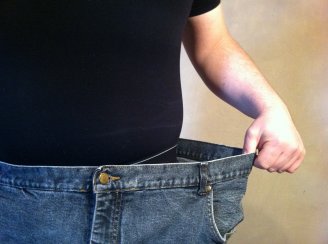
Maintaining a healthy weight is something that nearly all people are concerned about from time to time. If you are not one of them, you should be. Being overweight dramatically increases your risk for a long list of health-related complications. It can also affect your emotional health. When weight becomes a concern, people suddenly find themselves perusing the internet and magazines, frantically searching for diets and tips that will help them control their weight. However, the real basics of how to lose weight are often lost or forgotten. With that said, here are five real tips to keep in mind at all times when you are trying to lose weight.
1. It really is calories in versus calories out.
If you have not heard this before, it means that you must use more energy than you consume in order to lose weight. If you eat 500 calories worth of cookies at night, and you only burn about 300 more calories before bed, your body stores the remaining 200 calories. These 200 calories get stored as – you guessed it – fat. One pound of fat is equivalent to about 3,500 calories. That means that in order to lose one pound of fat, you must burn 3,500 calories more than you consume. That sounds like a lot, and it is, but your basal metabolic rate also helps (more on that later). But then how do some people seem to lose several pounds over the course of a week or even a few days? That brings us to our next tip.
2. Know how to weigh yourself properly.
It sounds like the simplest thing, right? You step on a scale and it tells you how much you weigh. Unfortunately, there is so much more to it than most people realize. Your weight can change dramatically throughout the day based on meals, exercise, fluids, and even what you are wearing. Your weight can fluctuate between 2 to 10 pounds during the day, and for some it can even fluctuate up to 20 pounds. The best way to accurately weigh yourself is by doing it in the morning, after you use the washroom, and before you consume any food or liquids. It is also better to weigh yourself while wearing as little clothing as possible. Furthermore, it is important to be consistent with how you weigh yourself. For example, if you weigh yourself before breakfast one day, do not weigh yourself after breakfast the next day. Weighing yourself properly is important because, well, it tells you how much you weigh. Knowing how much you weigh is vital to weight management so that you can determine if you are a healthy weight, see your changes in weight, and know your current basal metabolic rate.
3. Find out your basal metabolic rate.
This is crucial for weight management. What is a basal metabolic rate? Your basal metabolic rate, or BMR, is how many calories your body needs per day in order to function. It is how many calories you would burn if you were to just lay in bed all day and never move. In other words, it is how many calories your body will automatically burn every single day. That means that if your BMR is 1,200 calories then you have to eat at least 1,200 calories worth of food every day to maintain your weight and survive. Of course, this is the bare essential. You would have to eat even more calories when you consider any walking, moving, or exercising you might do that day in order to maintain your weight. Your BMR changes as your weight changes. You should re-calculate your BMR every time your weight has changed by about five pounds. Heavier people, especially those with more muscle, have higher BMRs.
4. Lift weights.
Yes, you read that correctly in the paragraph above: people with more muscle have higher basal metabolic rates. That means that people with more muscle automatically burn more calories (and fat) without any effort or exercise. That being said, do not be scared to incorporate weight lifting into your workouts. Many people, especially women, avoid weight lifting altogether because they do not want big muscles. However, big, intimidating muscles take years of intense training to build, and most women do not have enough testosterone in their bodies to build such a big physique. Weight lifting offers exercise that burns calories, increases strength, relieves stress, and continues burning calories even when you are resting. This brings us to our last tip.
5. Get a good night's sleep.
For weight loss and weight management our last tip is definitely something you have probably already been told over and over again: get a good night's sleep. Sleep plays a critical role in weight management. Sleep deprivation puts the brakes on your metabolism. Studies have shown that not only do people who sleep more burn more calories, but they also burn more actual fat than those who deprive themselves of sleep. Not getting enough sleep affects hunger hormones, as well, which increases how hungry you feel and decreases how full you think you are. Besides the physical changes to your body, sleep deprivation also disrupts your judgment. People are more likely to choose easier, unhealthy meals when they are tired, and they are understandably less interested in exercising or working out when they just want to be in their bed, sleeping. If you have trouble sleeping, your doctor may suggest sleeping aids, such as melatonin.
